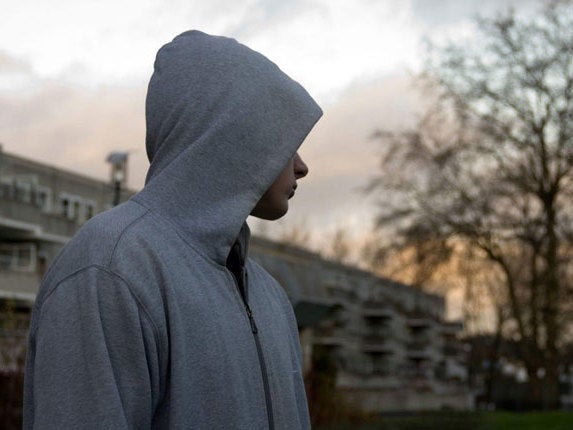Children being used to spy on terrorists, drug dealers and grooming gangs by British security services
Peers raise concerns about juveniles' safety and mental welfare as use of underage informants could increase

Children are being used to spy on terrorists, drug dealers and grooming gangs by police and security services in Britain.
The government admitted that the use of children as “covert human intelligence sources” could rise as teenagers are increasingly drawn into extremism, gang violence and “county lines” drug running.
A report by a House of Lords committee raised concern about proposals to extend the period – from one to four months – that police and the intelligence services use underage informants.
Lord Trefgarne, chairman of the Secondary Legislation Scrutiny Committee, said the change appeared to be founded on “administrative convenience” without sufficient protections in place.
“We are concerned that enabling a young person to participate in covert activity for an extended period of time may expose them to increased risks to their mental and physical welfare,” he wrote in a letter to the security minister.
“I cannot hide from you the committee’s considerable anxiety concerning the principle of employing young people – sometimes very young people – in this way.”
The Home Office was unable to give the number of juveniles currently being used as spies, which peers said they found “surprising”. The government department also said it did not have a breakdown of specific age groups.
The amendment to current law requires that sources the age of 16 should have an appropriate adult “qualified to represent the interests of the source” present at any meetings with their handler, but those between the ages of 16 and 18 are expected to go alone.

Peers said that a code of practice was “very vague” on how children’s welfare would be protected both while they are working for the security services and afterwards.
They questioned whether police and intelligence officers were capable of assessing juveniles’ mental health, and asked how a consistent approach was guaranteed across forces and other agencies including MI5 and the National Crime Agency.
“[The Home Office] also fails to explain how the authorising officer is supposed to weigh the intelligence benefits against the potential negative impact on the juvenile sources,” the report concluded.
“It does not fully satisfy our concerns about the extent to which juveniles are being used for covert surveillance or how their welfare is taken into account, and how extending their period of operation may affect them… these are serious, violent crimes and we have grave concerns about any child being exposed to such an environment.”
The Home Office argued that the one month limit meant law enforcement agents had to submit applications to renew a child informant within a “very short time” of them starting work, and puts more pressure on youngsters to complete their task.
It pledged to carry out monthly reviews of welfare and safety, and said juveniles cannot be deployed to obtain evidence against their parents or guardians.
But officials only consulted with security services, police bodies and the Crown Prosecution Service on the changes, rather than any organisations who deal with the safeguarding and health of juveniles.
The proposals, which would be implemented using the Regulation of Investigatory Powers (Juveniles) (Amendment) Order 2018, will be considered by the House of Lords on Tuesday and come into effect within 21 days if they are voted through.
In a letter to the committee, the security minister, Ben Wallace, said child spies “have a vital role to play in investigations by public authorities and can provide crucial evidence that cannot be obtained by any other means”.
“Given that young people are increasingly involved, both as perpetrators and victims, in serious crimes including terrorism, gang violence, county lines drugs offences and child sexual exploitation, there is increasing scope for juvenile CHIS [covert human intelligence sources] to assist in both preventing and prosecuting such offences,” Mr Wallace wrote.
“They may have unique access to information about other young people who are involved in or victims of such offences.”
He cited the example of criminal gangs and county lines drug running, where children as young as 12 are being used as mules to transport drugs from cities to smaller towns and rural areas.
The violence and intimidation used to control the lucrative supply lines is one of the factors driving up stabbings in England and Wales, as well as the number of known modern slaves.
“Much as investigators would wish to avoid the use of young people in such a role, it is possible that a carefully managed deployment of a young person could contribute to detecting crime and preventing offending,” Mr Wallace argued, saying child spies could protect other young people.
“We know from discussions with investigators that juvenile CHIS are authorised in very small numbers.”
The minister said the government has been conducting a review of the legal framework for 18 months, but did not say when it would come to a conclusion or whether the findings will be made public.
“Juvenile covert human intelligence sources are used very rarely and only ever when it is necessary and proportionate, and when there is no other less intrusive way to get the information needed to convict criminals or terrorist suspects,” a Home Office spokesperson said.
“Their use is governed by a strict legal framework and is overseen by the Investigatory Powers Commissioner, Lord Justice Fulford. Throughout any deployment and beyond, the welfare of the young person is the paramount consideration.”
Bookmark popover
Removed from bookmarks